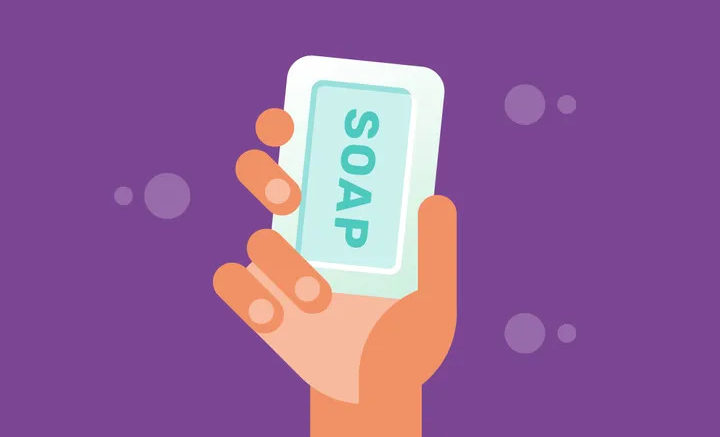Is Bar Soap Safe To Use During The Coronavirus Pandemic?
Experts weigh in on whether you should wash your hands, face and body with bar soap to prevent the spread of COVID-19.
Most of us are most comfortable using liquid soap during the coronavirus pandemic, because it allows each user to pump out their own ration. But what about bar soap?
It’s been having a moment in the past year, as it’s more sustainable, easier to find and usually cheaper than liquid soap. Not to mention it’s the only plastic-free soap option and can be used to clean hands, body and face.
But when bar soap is shared among several people, is it hygienic and safe to use during the pandemic? Or is it just a dangerous breeding ground for the virus? We spoke to doctors to find out.
Bar Soap Is Not A Hospitable Environment For A Virus
Soap works against the coronavirus because it destroys the lipid membrane that surrounds the virus, leading it to fall apart.
Simply put, science has shown that a virus cannot live on any soap, including bar soap. That’s why you’re encouraged to wash your hands with soap and water as often as possible.
(Note: Don’t confuse soap with hand sanitizer, which isn’t as effective as soap in removing germs, according to the Centers for Disease Control and Prevention.)
But Can Bacteria Live On A Bar Of Soap?
Keep in mind that bacteria and viruses are two different things.
Bacteria (such as Staphylococcus aureus) cannot be transmitted from one person to another via a bar of soap, an extensive study concluded in 1965.
A follow-up study in 1988 looked at whether bacteria such as E. coli and Pseudomonas aeruginosa would transfer from infected bars of soap to a test group. The results confirmed the results of the initial study: Bacteria on a bar of soap can’t be transmitted via hand-washing.
If you’re still not convinced, you can always take extra precautions. You can use liquid soap instead of bar soap, but be mindful not to touch the pump, as you may risk contamination from the container. Liquid “soap is normally in a plastic container, and it’s very hard to use it without touching the outside,” said Darien Sutton, an emergency physician in New York.
How To Properly Store Bar Soap
If bar soap is your only option, rinse it properly before and after every use.
“Once you’re done with the soap, rinse it off and place it in a dry, open container. If you close it, it’s an opportunity for humidity to build up on the surfaces to allow for bacteria to prosper,” Sutton told HuffPost.
The Verdict On Bar Soap
The bathroom is a particularly active breeding ground for bacteria. If you share a bathroom with people who go in and out of the house, you and the others should have separate soaps, and you should clean the bathroom after every use with bleach or a product with a minimum of 60% isopropyl alcohol, Sutton recommended.
But don’t obsess over the kind of soap you use, Sutton added. When you share a bathroom with someone, you will probably contaminate surfaces one way or another, whether you share bar soap or not.
In the end, just remember to keep washing your hands with soap, whether it’s from a bar or a bottle.
This is an excerpt from an article published on Huffington Post.
在冠狀病毒疫情期間,可以安全地使用香皂嗎?
專家會權衡是否應使用香皂來清洗雙手,臉部和身體,來防止冠狀病毒的傳播。
在冠狀病毒疫情期間,大部分人都習慣使用洗手液,因為它使每個人都可以獨立取出自己的所需用量。但是,何不也考慮使用香皂呢?
在過去的一年中,發現香皂比洗手液更可持續,及容易找到而且通常更便宜,香皂更是唯一不含塑料的皂性清潔選擇,也可同時用於清潔雙手,身體和臉部。
但是,當我們共用香皂時,在疫情期間能確保衛生及安全嗎?香皂件會否有機會成為病毒的溫床?讓我們向醫生諮詢以找出答案。
香皂不是病毒的有利環境
香皂能夠抵抗冠狀病毒,因為它可破壞圍繞病毒的脂質膜,並導致其分解。
簡而言之,科學證明病毒不能在任何香皂上生存,包括條狀香皂。因此建議您盡可能多用香皂和清水來洗手。
(請注意:請勿將香皂與免洗消毒搓手液混淆,根據美國疾病管制與預防中心的說明,免水消毒搓手液在清除細菌方面不及香皂有效。)
但是細菌可以在香皂上生存嗎?
請記住,細菌和病毒是兩回事。
細菌(例如金黃葡萄球菌)不能通過香皂從一個人傳播到另一個人,這項廣泛的研究已於1965年得出結論。
1988年的一項後續研究,研究了例如大腸桿菌和綠膿桿菌等細菌是否會從香皂上轉移到接受測試的群組當中。結果證實了最初的研究結果:香皂件上的細菌是不能通過洗手而傳播的。
如果您仍然不確定,可以隨時採取額外的預防措施。您可以用洗手液來代替香皂件,但請注意不要觸摸洗手液容器的泵頭,因為這可能會造成由接觸容器而受到感染的風險。紐約的急診科醫生達里恩·薩頓(Darien Sutton)表示:「洗手液通常是存放於塑膠容器之中,使用時是很難不接觸到容器的外部。」
如何正確存放香皂
如果您只會使用香皂,請在每次使用之前和之後都進行適當的沖洗。
用完香皂後,請將其沖洗乾淨並放在乾燥且開放的容器中。如果將容器關閉,可能會令香皂表面上形成濕氣,使細菌有機會積聚」薩頓 ( Sutton ) 對《赫芬頓郵報》說。
關於香皂的結論
薩頓(Sutton )建議,浴室是細菌活躍的溫床,如果您與其他會進出房子的人共用一間浴室,則您和其他人應各自使用獨立的香皂。並於每次使用浴室後,都使用漂白劑或含有至少60%異丙醇的產品來清潔浴室。
薩頓(Sutton )補充說,不需執著於應使用那一款香皂,因為當您與其他人共用一間浴室時,不論是否共用香皂,您都可能會以各種不同方式污染到浴室的地面或其他表面。
最後,請緊記要持續使用香皂清洗雙手,不論是使用香皂或樽裝洗手液。
摘自《赫芬頓郵報》上發表的一篇文章。

